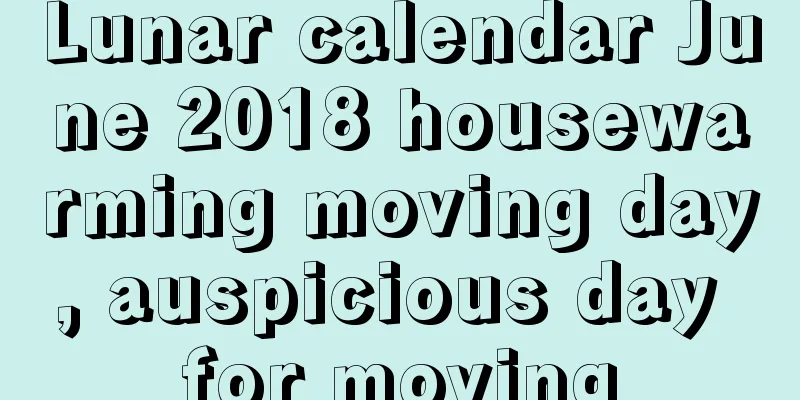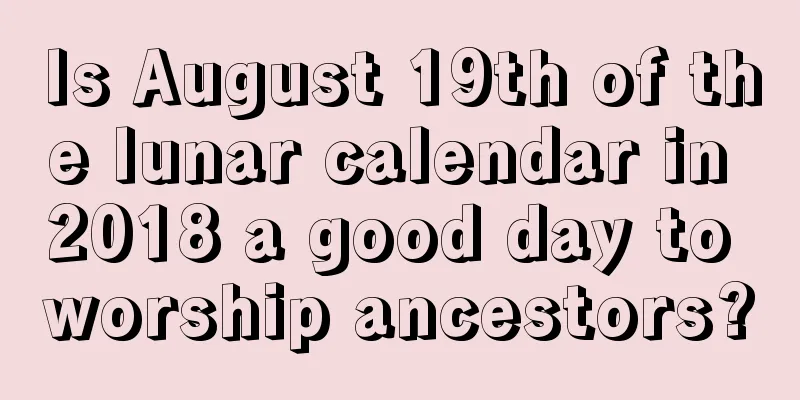What is the twelfth lunar month and what does the "La Festival" in the twelfth lunar month mean?

Introduction: The twelfth lunar month is a very important month, and there are many customs related to it. La Festival is one of them. So what season of winter is the twelfth lunar month, and what does the "La Festival" in the twelfth lunar month mean? Want to know more about the auspicious and inauspicious days in the twelfth month of the lunar calendar in 2018? Pay attention to Shuimoxiansheng.com’s special topic on the twelfth month of the lunar calendar!What kind of winter is the twelfth lunar month?December is the last month of the year, commonly known as the end of the year. It has more than 30 names for it, such as Ladong, Candong, Qiongdong, Layue, Bingyue, Yuyue, Jiyue, Qingsi, Dongsu, and Dalu.It is called "La Yue" because "La" is the name of the ancient ancestor worship and gods. There is a saying that "three days after the winter solstice, sacrifice to all gods". That is, the third day after the winter solstice contains the earthly branch "Xu" in the heavenly stems and earthly branches. During the Southern and Northern Dynasties, it was fixed on the eighth day of the twelfth lunar month. Traditionally, people would hunt animals and hold grand sacrifices to worship gods and ancestors in order to pray for blessings and longevity, avoid disasters and welcome good luck. This memorial ceremony is called "hunting sacrifice". Because "La" and "Lie" are homophones, "Lieji" was written as "Laji", and thus the twelfth month of the year is called Layue. This custom originated in the Qin and Han Dynasties. In 221 BC, Qin Shihuang unified China and ordered the formulation of a calendar. The twelfth month, when the old year turns into the new year at the end of winter and the beginning of spring, was called "La Yue" and the eighth day of the twelfth month was called "La Ri". What does the “La Festival” in the twelfth lunar month mean?La Festival is a traditional folk sacrificial culture with a long history. Taoism divides the year into five La days, and believes that these five La days are suitable for fasting and worshiping ancestors. Volume 37 of Yunji Qiqian states: "The first day of the first lunar month is called Tianla, the fifth day of the fifth lunar month is called Dila, the seventh day of the seventh lunar month is called Daode La, the first day of the tenth lunar month is called Minsui La, and the festival day of the twelfth lunar month is called Houwang La. These five La days are suitable for fasting and offering sacrifices to ancestors."The ancients would go hunting in the twelfth lunar month and use the captured animals as "sacrifices" to offer to their ancestors. According to the "Customs and Practice", "La" means hunting. People hunt animals to offer sacrifice to their ancestors, or it is the transition between the old and the new year, and people hold a grand hunting sacrifice to repay their merits." From this we can see that "La" means hunting, and using the hunted wild animals or the poultry raised by oneself to offer sacrifices to ancestors and gods. Until now, people still call the pork, beef and mutton pickled in the twelfth lunar month "bacon". Explanation of the origin of the "La Festival" in the twelfth lunar month:Legend has it that the "La Festival" was originally a "year-end sacrifice" in the era of Shennong (or Yiji) to "worship gods and ghosts" and "gather all things to enjoy them".Due to the conservatism of religion and customs themselves and the promotion of successive ruling classes for their own purposes, this traditional Chinese ritual, which originated in the primitive era of low productivity, has been preserved in various historical periods with relatively low productivity. It continued until the early 1940s and evolved into the custom of "Spring Festival". La Festival was an important winter festival in ancient China. Today's Laba Festival and Kitchen God Festival both originated from it. Since the "La Festival" was often held in December, this month was called La Yue after the Qin and Han Dynasties. But the date of "La Festival" was not fixed at that time, "La Festival" was held on "a day chosen". By the Han Dynasty, the "La Festival" was added with the "Nuo" activity to drive away evil spirits. At this time, the "La Festival" was also fixed to the third Xu day after the winter solstice. The word "La" is explained in "Shuowen Jiezi": "La, three days after the winter solstice, is the day to offer sacrifices to all gods." During the Southern and Northern Dynasties, it was said that there were eight gods in the "La Festival", and the "La Festival" was fixed to the eighth day of the twelfth lunar month, thus giving rise to the Laba Festival. During the Han Dynasty, the specific day of the La Festival was the third Xu day after the winter solstice, because in ancient times people used the Heavenly Stems and Earthly Branches to count days and months. By the Southern Dynasties, "Jingchu Sui Shi Ji" had clearly recorded that "December 8th is the Laba Day", which is equivalent to today's Laba Festival. Fortunes in life can be good or bad, and calculating the direction of your fortune in advance can help you nip problems in the bud, reverse unfavorable situations, and make your life smoother and brighter. To calculate your life fortune over the next ten years, please click on the [Premium Calculation] button below for accurate calculation. I wish you all the best in your life! |
>>: Is there a leap month in the twelfth lunar month? How to calculate the leap month
Recommend
What is the lunar calendar for September 18th, 2019? Can I get married and hold a wedding?
What day is September 18th in the lunar calendar ...
Is April 8th, Mother's Day in 2022 an auspicious day? Is it an auspicious day?
The fourth month of the lunar calendar is the firs...
Is the third day of the twelfth lunar month in 2021, the Minor Cold, an auspicious day? Can the funeral be held on this day?
It is the end of December, and as the days go by, ...
A complete analysis of the lunar calendar date and auspiciousness and inauspiciousness of the 12 hours of National Day in 2019!
Introduction: Not only does every day have good an...
Which historical figures are related to the Dragon Boat Festival? Why do we eat rice dumplings and race dragon boats during the Dragon Boat Festival?
The Dragon Boat Festival, also known as the Duanya...
What is the fate of a girl born on the second day of the seventh lunar month? Is it a lucky sign for your husband?
Introduction: In our country, there is not only a ...
Are boys born on October 29th of the lunar calendar in 2018 born under the Dog sign naturally lucky in terms of wealth?
Introduction: Although no one can choose the day o...
Is the fate of a boy born on the first day of the twelfth lunar month in 2018 good or bad?
Different children are born every day, and their d...
Is it a good day to move house on the 19th day of the 12th lunar month in 2020?
People usually choose a good time to move into a n...
What gifts should I buy for my family during the Spring Festival in 2019? Gift Giving Notes
With the arrival of the 2019 Spring Festival, the ...
Is the second day of the leap April in 2020 an auspicious day for travel? Here are some things to pay attention to when traveling!
Travel refers to going out, traveling, etc. 2020 i...
Can the contract be signed on September 21st of the lunar calendar in 2018?
Can the contract be signed on September 21st of th...
Is April 27th, 2020, an auspicious day for breaking ground and moving graves? Check the auspiciousness and inauspiciousness of June 18th!
Introduction: It is necessary to choose an auspici...
Is it suitable to pick up a car on Mother’s Day, March 28, 2021? What is the hexagram?
In late spring in March, the orioles are singing. ...
Can I burn incense and pray on the 16th day of the first lunar month in 2019? Is the hexagram today a good day?
Introduction: In our country’s tradition, burning ...









